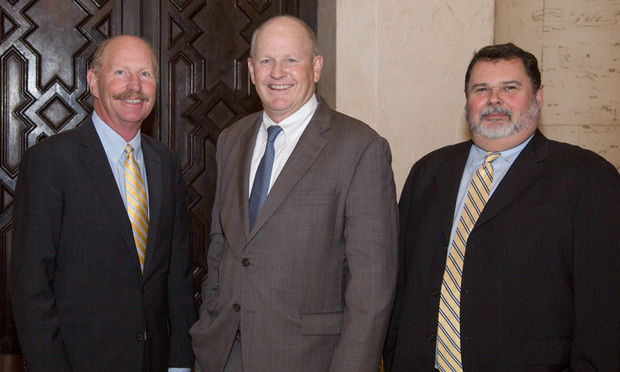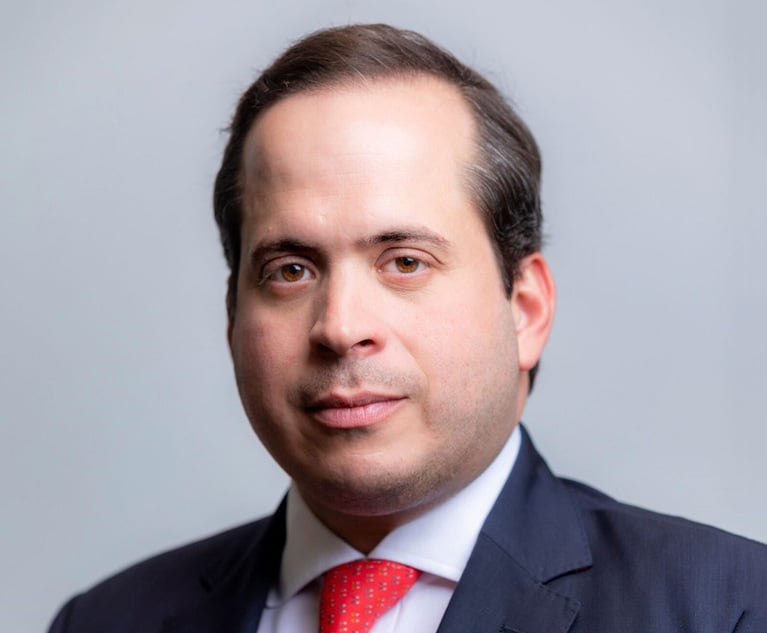In 75th Year, Fowler White Leverages Tech to Stay Ahead
Fowler White Burnett has 75 attorneys in four offices with a focus on health care, products liability, insurance, business transactions, tax issues and maritime.
March 12, 2018 at 10:59 AM
6 minute read

Richard A. Wood, Christopher E. Knight and Edward J. Briscoe lead Fowler White Burnett as managing partners of the midsize law firm, which is celebrating its 75th anniversary.
The partners responded to questions giving an overview of the firm.
How big is your firm, where is it located, and what are its primary areas of practice and focus?
Fowler White Burnett is a full-service Florida law firm with more than 75 attorneys practicing in our Miami, Fort Lauderdale, West Palm Beach and Naples offices. Our core practice groups include medical malpractice/health care, products liability and toxic torts, insurance, domestic and international business transactions/tax and maritime.
Please explain your firm's governance structure and compensation model.
Our firm is governed by a management committee made up of three managing shareholders elected for staggered three-year terms. The current committee is comprised of Edward J. Briscoe, Christopher E. Knight and Richard A. Wood. Our compensation system is not formulaic, but rather it is based on multiple criteria such as business generation, financial performance, profitability and a number of other intangible measures, including corporate citizenship.
What do you view as the two biggest opportunities for your firm, and what are the two biggest threats?
We are strategically growing and expanding our core practice groups to take advantage of the region's growth and have made significant investments in our maritime, insurance, product defect/mass tort and international business tax groups, including the expansion of our trademark and patent practices.
Our biggest threats are shared by all firms in the legal industry, ever increasing competition, commoditization of legal services and stiff resistance to rate increases. We have invested heavily in technology, business development and marketing for attorneys to offset these challenges.
After the recession hit, the prevailing theory was that midsize firms would start to see more work come their way from large clients who could no longer justify paying Big Law rates. What has been your experience?
We weathered the Great Recession in large part due to our longstanding firm policy of fiscal responsibility. We have historically operated with no debt. Our client base is worldwide, and we work with many out-of-state and international firms through our affiliation with ALFA International. We have enhanced our financial position since the recession and strengthened our balance sheet in virtually every aspect, and recently enjoyed some of the most successful years in the firm's history.
Are your clients pushing for more alternative fee arrangements, and if so what types? Is your firm amenable to those requests?
We are always open to discussions with our clients, and we work with them on fee arrangements when it makes sense for both the firm and the client. By investing in technology and our attorneys' practices, we have increased efficiency in the delivery of our legal services and remain highly competitive from a fee standpoint in both the traditional hourly rate as well as AFAs.
There is much debate around how law firms can foster the next generation of legal talent. What advantages and disadvantages do midsize firms have in attracting and retaining young lawyers, particularly millennials?
The firm's strategy and culture over the course of 75 years has been the recruitment and retention of highly talented attorneys and support staff. We have focused on and successfully preserved the firm's culture and maintained a highly collegial and professional workplace. We have consistently invested in our younger attorneys, providing training, legal education, leadership and business development. We have been ahead of the curve on flex time and recognizing life-work balance.
Does your firm employ any nonlawyer professionals in high-level positions (e.g. COO, business development officer, chief strategy officer, etc.)? If so, why is it advantageous to have a nonlawyer in that role? If not, have you considered hiring any?
We have an executive director with a high level of authority who overseas our nonlegal, day-to-day operations in cooperation with our management committee, along with comptroller, human resources, information technology, marketing and office services. Their expertise and focus in on the nonlegal operations of the firm and support of our attorneys' practices.
What if any technology advancements have you made in your firm in recent years? What are the challenges in implementing tech changes?
Technology, security and training are at the top of tech challenges. Yet staying abreast of the latest advances in technology, data security and training our employees are just a few of the ways in which we provide our clients with exceptional service. Our network is designed to provide cohesion and redundancy between all of our offices for us to be able to work as efficiently as possible. We give our employees access to the latest tools and software needed to handle the demands of the legal workplace today and tomorrow, whether it's through the use of our cloud-based document management system, NetDocuments, using the latest e-discovery tools like Logikcull or Relativity or providing effective tools for collaboration with other firms. Clients demand efficiency, which is achieved when all of the tools are used.
What would you say is the most innovative thing your firm has done recently, whether it be internal operations, how you work with clients, etc.?
Recently we contracted with an outside training company to maximize the software proficiency of all our attorneys, paralegals and legal assistants. We are taking it a step further and having those same people tested to become certified. Doing so further demonstrates to the market, and our clients, the firm's commitment to providing the most cost-effective legal representation possible. Our goal is to bring value to our clients and exceed their expectations. That requires us to stay focused on opportunities and leverage technology to the fullest extent possible. Finally, along with providing a solid infrastructure, the most advanced software as well as the training certification of all of our employees, our highest priority is keeping our data secure and client information safe. We provide our attorneys secure access to our systems anywhere, anytime and on any device. Protecting client data is a 24/7 responsibility we take very seriously. We are HIPAA compliant and adhere to PCI and ISO standards. We have implemented multiple layers of security to defend against cyberwarfare and use tools such as dual authentication using Duo Mobile, geo-fencing, whitelisting, data analytics, DNS
and internet monitoring, etc., to ensure our data is always secure. We are proactive and forward-thinking on all fronts rather than reactive.
Does your firm have a succession plan in place? If so, what challenges do you face in trying to execute that plan? If you don't currently have a plan, is it an issue your firm is thinking about?
Succession planning is part of our firm culture. We are currently celebrating our 75th anniversary in South Florida and continually update our strategic plan with the future in mind.
This content has been archived. It is available through our partners, LexisNexis® and Bloomberg Law.
To view this content, please continue to their sites.
Not a Lexis Subscriber?
Subscribe Now
Not a Bloomberg Law Subscriber?
Subscribe Now
NOT FOR REPRINT
© 2025 ALM Global, LLC, All Rights Reserved. Request academic re-use from www.copyright.com. All other uses, submit a request to [email protected]. For more information visit Asset & Logo Licensing.
You Might Like
View All
How Uncertainty in College Athletics Compensation Could Drive Lawsuits in 2025

'As I've Grown Older': John Morgan Looks Back at a Life in Law

Race for Clerk and Comptroller in Miami-Dade: Juan Fernandez-Barquin vs. Sen. Annette Taddeo
11 minute read
Meet Jesus M. Suarez: New Chair of the Eleventh Circuit Judicial Nominating Commission
4 minute readTrending Stories
- 1NBA Players Association Finds Its New GC in Warriors Front Office
- 2Prenuptial Agreement Spousal Support Waivers: Proceed With Caution
- 3DC Circuit Keeps Docs in Judge Newman's Misconduct Proceedings Sealed
- 4Litigators of the Week: US Soccer and MLS Fend Off Claims They Conspired to Scuttle Rival League’s Prospect
- 5Litigator of the Week Runners-Up and Shout-Outs
Who Got The Work
J. Brugh Lower of Gibbons has entered an appearance for industrial equipment supplier Devco Corporation in a pending trademark infringement lawsuit. The suit, accusing the defendant of selling knock-off Graco products, was filed Dec. 18 in New Jersey District Court by Rivkin Radler on behalf of Graco Inc. and Graco Minnesota. The case, assigned to U.S. District Judge Zahid N. Quraishi, is 3:24-cv-11294, Graco Inc. et al v. Devco Corporation.
Who Got The Work
Rebecca Maller-Stein and Kent A. Yalowitz of Arnold & Porter Kaye Scholer have entered their appearances for Hanaco Venture Capital and its executives, Lior Prosor and David Frankel, in a pending securities lawsuit. The action, filed on Dec. 24 in New York Southern District Court by Zell, Aron & Co. on behalf of Goldeneye Advisors, accuses the defendants of negligently and fraudulently managing the plaintiff's $1 million investment. The case, assigned to U.S. District Judge Vernon S. Broderick, is 1:24-cv-09918, Goldeneye Advisors, LLC v. Hanaco Venture Capital, Ltd. et al.
Who Got The Work
Attorneys from A&O Shearman has stepped in as defense counsel for Toronto-Dominion Bank and other defendants in a pending securities class action. The suit, filed Dec. 11 in New York Southern District Court by Bleichmar Fonti & Auld, accuses the defendants of concealing the bank's 'pervasive' deficiencies in regards to its compliance with the Bank Secrecy Act and the quality of its anti-money laundering controls. The case, assigned to U.S. District Judge Arun Subramanian, is 1:24-cv-09445, Gonzalez v. The Toronto-Dominion Bank et al.
Who Got The Work
Crown Castle International, a Pennsylvania company providing shared communications infrastructure, has turned to Luke D. Wolf of Gordon Rees Scully Mansukhani to fend off a pending breach-of-contract lawsuit. The court action, filed Nov. 25 in Michigan Eastern District Court by Hooper Hathaway PC on behalf of The Town Residences LLC, accuses Crown Castle of failing to transfer approximately $30,000 in utility payments from T-Mobile in breach of a roof-top lease and assignment agreement. The case, assigned to U.S. District Judge Susan K. Declercq, is 2:24-cv-13131, The Town Residences LLC v. T-Mobile US, Inc. et al.
Who Got The Work
Wilfred P. Coronato and Daniel M. Schwartz of McCarter & English have stepped in as defense counsel to Electrolux Home Products Inc. in a pending product liability lawsuit. The court action, filed Nov. 26 in New York Eastern District Court by Poulos Lopiccolo PC and Nagel Rice LLP on behalf of David Stern, alleges that the defendant's refrigerators’ drawers and shelving repeatedly break and fall apart within months after purchase. The case, assigned to U.S. District Judge Joan M. Azrack, is 2:24-cv-08204, Stern v. Electrolux Home Products, Inc.
Featured Firms
Law Offices of Gary Martin Hays & Associates, P.C.
(470) 294-1674
Law Offices of Mark E. Salomone
(857) 444-6468
Smith & Hassler
(713) 739-1250






